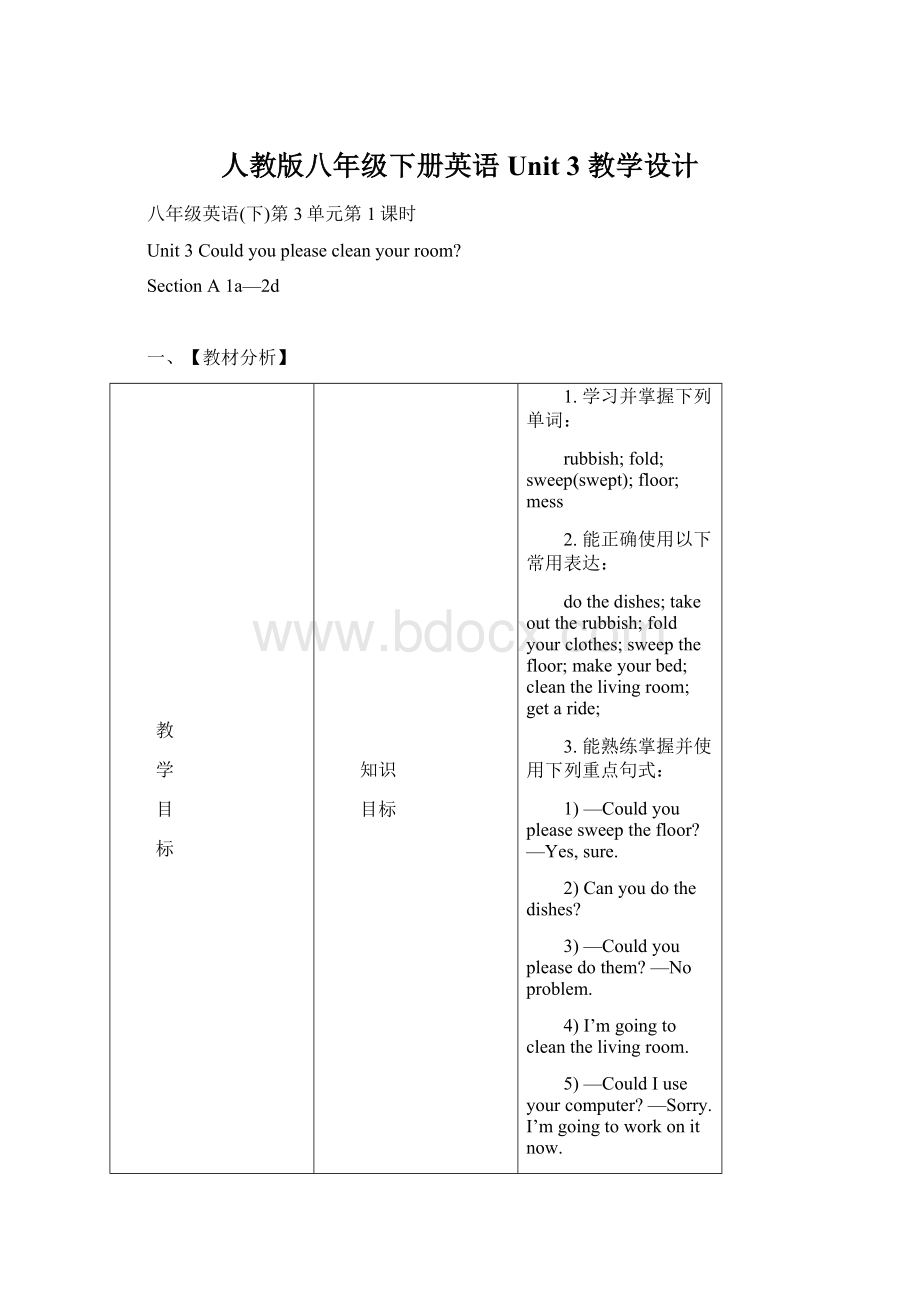人教版八年级下册英语 Unit 3 教学设计.docx
《人教版八年级下册英语 Unit 3 教学设计.docx》由会员分享,可在线阅读,更多相关《人教版八年级下册英语 Unit 3 教学设计.docx(38页珍藏版)》请在冰豆网上搜索。

人教版八年级下册英语Unit3教学设计
八年级英语(下)第3单元第1课时
Unit3Couldyoupleasecleanyourroom?
SectionA1a—2d
一、【教材分析】
教
学
目
标
知识
目标
1.学习并掌握下列单词:
rubbish;fold;sweep(swept);floor;mess
2.能正确使用以下常用表达:
dothedishes;takeouttherubbish;foldyourclothes;sweepthefloor;makeyourbed;cleanthelivingroom;getaride;
3.能熟练掌握并使用下列重点句式:
1)—Couldyoupleasesweepthefloor?
—Yes,sure.
2)Canyoudothedishes?
3)—Couldyoupleasedothem?
—Noproblem.
4)I’mgoingtocleanthelivingroom.
5)—CouldIuseyourcomputer?
—Sorry.I’mgoingtoworkonitnow.
6)—CouldIwatchTV?
—Yes,youcan,butfirstyouhavetocleanyourroom.
7)Couldyoupleasehelpoutwithafewthings?
8)CouldIatleastfinishwatchingthisshow?
9)Couldyoutakeouttherubbish,foldtheclothesanddothedishes?
能力
目标
通过听说训练,学会谈论如何征求许可以及如何进行礼貌地请求。
情感
目标
通过本课的学习,能够谈论如何征求许可以及如何进行礼貌地请求的方式,学会关心社会,帮助他人。
教学重点
谈论如何征求许可以及如何进行礼貌地请求
教学难点
正确使用本课常用表达;听力训练。
教学方法
情景教学法;任务型教学法。
二、【教学流程】
环节
师生活动
二次备课
I.Preparation
准备
1)课前3分钟检查单词预习情况,教师根据学生读的状况,适当领读,帮助学生正音。
2)找两名学生上台,听写本课所用到的单词和短语:
choredishsweeptrashfoldmeeting,dothedishes,sweepthefloor,takeoutthetrash,workonthecomputer,stayoutlate,getaride师生先共同批改黑板上的,然后小组内互批互改,组长报告结果。
3)Revision“复习检查”
Reviseandlearnsomewords:
通过检查“学案”中“新知预习”内容检查预习效果。
II.Presentation
呈现
1.Learningtasks“示标定向”出示这节课的三维学习目标。
1)学习并掌握下列单词:
rubbish;fold;sweep(swept);floor;mess
2)能正确使用以下常用表达:
dothedishes;takeouttherubbish;foldyourclothes;sweepthefloor;makeyourbed;cleanthelivingroom;getaride;
3)能熟练掌握并使用下列重点句式:
(1)—Couldyoupleasesweepthefloor?
—Yes,sure.
(2)Canyoudothedishes?
(3)—Couldyoupleasedothem?
—Noproblem.
(4)I’mgoingtocleanthelivingroom.
(5)—CouldIuseyourcomputer?
—Sorry.I’mgoingtoworkonitnow.
(6)—CouldIwatchTV?
—Yes,youcan,butfirstyouhavetocleanyourroom.
(7)Couldyoupleasehelpoutwithafewthings?
(8)CouldIatleastfinishwatchingthisshow?
(9)Couldyoutakeouttherubbish,foldtheclothesanddothedishes?
2.Leading-in“导入新课”
(1)Learnsomewordsandexpressionsaboutthechores:
T:
Thisclasswetalkaboutthechores.Whatchoresdoyouknow?
竞赛游戏:
学生四人一组讨论,一名代表回答,看那组的最多为胜者,加以鼓励。
教师将所涉及到的短语展示在屏幕或黑板上,带领学生读两遍。
如:
dothedishes;takeouttherubbish;foldyourclothes;sweepthefloor;makeyourbed;cleanthelivingroom;getaride.
(2)Makesomeconversationswiththephrasesabove..
T:
Canyoudothedishes?
Ss:
Yes,Ican.
T:
Couldyoupleasedothedishes?
Ss:
….
以这种句型练习多个短语,让学生体验情态动词can和could的用法区别。
III.Practice
操练
1.机械操练(MechanicalDrills)
1)1aFirstreadandtranslatethephrases.Thenworkinpairs.Discusswithyourpartner.
—Doyou______________athome?
—Yes,Ido./No,Idon’t.
可以带入这些短语:
1dothedishes,2sweepthefloor,3takeoutthetrash,4makeyourbed,5foldyourclothes,6cleanthelivingroom
2.有意义操练(MeaningfulDrills)
1bNowlet’sgotoPeter’shouse.AndlistentowhatPeterandhismotherdo.
Chores
Peter’mother
Peter
dothedishes
M
sweepthefloor
M
takeoutthetrash
P
makethebed
P
foldtheclothes
P
cleanthe
livingroom
M
Listentothetapeandfillinthechart.
Checkuptheanswers.
Listenandrepeat.
LastaccordingtothechartdescribethechoresthatPeterandPeter’smotherdo.
1cPairwork
Lookatthepictureabove.Askyourpartnertodothechoresthatyousee.
A:
Couldyoupleasesweepthefloor?
B:
Yes,sure.
这时,在体验和练习的基础上,让学生看本单元的语言目标:
礼貌的请求和申请许可,能有所理解。
3.交际性操练(CommunicativeDrills)
Maketheirownconversationsaboutthechores,andthensharetheirnewconversations.
A:
Couldyoupleasesweepthefloor?
B:
Yes,sure.Canyoudothedishes?
A:
Well,couldyoupleasedothem?
I’mgoingtocleanthelivingroom.
B:
Noproblem.
IV.Consolidation
巩固
Listeningpractice:
1.2a
Firstgetthestudentstolookthroughthepicturesandtrytoconjecturewhatthey’llhear.
Thengetthemtolistenandcheckyesorno..
Sharetheiranswers.
2.2b
Givethestudents20secondstoprepareforlistening.
Listenagain.WhydoesPeter’sfathersay“no”?
Drawlinestothereasonsinthechartin2a.
Sharetheiranswers.
V.Examination
检测
1.引导学生小结梳理知识框架、规律、方法,并对合作小组当堂学习情况进行总结评价,巩固学生所获得的语言知识和经验,让学生在评价中反思,在反思中进步。
Askoneofthestudentstosaywhattheyhavelearnt.
1)words2)phrases3)sentences
2.当堂检测(见学案):
教师要随堂进行评价,批改可以由学习小组内互批、组间互批、集体订正等方法,批阅后教师要统计达标情况,收集反馈信息,当堂矫正补救。
VI.Assignment
作业
1.口头作业:
听并跟读录音,编对话,背笔记。
2.书面作业:
Rememberthenewwordsof1a-2d.
Finishofftheexercises.
Previewthenewwordsof3a-3c.
三、【板书设计】
Unit3Couldyoupleasecleanyourroom?
SectionA1a—2d
四、【教后反思】
SectionA3a—4c
一、【教材分析】
教
学
目
标
知识
目标
1.学习并掌握新词汇:
throw;allthetime;neither;shirt;pass;borrow;lend;finger;hate;while
2.能正确使用以下常用表达:
throwdown;comeover;allthetome;helpout;shoutback;insurprise;neitherofus;assoonas;passsb.sth.=passsth.tosb.;borrowsth.fromsb.;lendsb.sth.;hatetodosth.
3.学会使用以下句型:
1)WhywasNancy’smomangrywithNancy?
2)YouwatchTVallthetimeandneverhelpoutaroundthehouse.
3)Ican’tworkalldayanddohouseworkallevening.
4)I’mjustastiredasyou.
5)Mymomdidnotsayanythingandwalkedaway.
6)Neitherofusdidanyhouseworkforaweek.
7)CouldIborrowthatbook?
8)Couldyoulendmesomemoney?
能力
目标
通过阅读训练,培养学生的良好的阅读理解能力,同时使学生在理解故事情节的基础上对文章进行进一步的解读,以实现对学生进行有利的情感教育的目的。
情感
目标
通过本课的学习,让学生学会尊重家长,同时也要做一些力所能及的家务。
教学重点
重点词汇、常用表达及句型。
教学难点
在理解故事情节的基础上对文章进行进一步的解读。
教学方法
情景教学法;任务型教学法。
二、【教学流程】
环节
师生活动
二次备课
I.Preparation
准备
课前3分钟检查单词预习情况,教师根据学生读的状况,适当领读,帮助学生正音。
1.Freetalk“自由交际”
1)Makeconversationstotalkaboutthechores.
e.g.:
—I’mverybusy.Couldyoupleasehelpmeoutwithafewthings?
—CouldIfinishwatchingtheshow?
—No.Couldyoupleasetakeouttherubbish?
—Somuch?
—Couldyouplease…?
2)Roleplaytheconversation.(2d)
2.Revision“复习检查”
通过检查上节课布置的作业落实作业完成情况,进而为新课的导入铺路搭桥。
通过检查“学案”中“新知预习”内容检查预习效果,
II.Presentation
呈现
1.Learningtasks“示标定向”
1)学习并掌握新词汇:
throw;allthetime;neither;shirt;pass;borrow;lend;finger;hate;while
2)能正确使用以下常用表达:
throwdown;comeover;allthetome;helpout;shoutback;insurprise;neitherofus;assoonas;passsb.sth.=passsth.tosb.;borrowsth.fromsb.;lendsb.sth.;hatetodosth.
3)学会使用以下句型:
(1)WhywasNancy’smomangrywithNancy?
(2)YouwatchTVallthetimeandneverhelpoutaroundthehouse.
(3)Ican’tworkalldayanddohouseworkallevening.
(4)I’mjustastiredasyou.
(5)Mymomdidnotsayanythingandwalkedaway.
(6)Neitherofusdidanyhouseworkforaweek.
(7)CouldIborrowthatbook?
(8)Couldyoulendmesomemoney?
2.Leading-in“导入新课”
以“谈论学生与父母曾经发生过的矛盾”的自由对话开始,导入3a的学习,在学生明白文章意思并熟读的基础上,学习巩固短文中的知识点。
III.Practice
操练
1.速读(FastReading)
Readquicklyandfindtheanswerstothequestions:
(1)WhywasNancy’smomangrywithNancy?
(2)Didtheysolvetheproblem?
How?
2.精读(IntensiveReading)
Readthepassagecarefullyandunderlinethesentencesfromthereadingthatmeanthesamething.
(1)Neitherofusdidanyhouseworkforaweek.
(2)MymomcameoverassoonasIsatdowninfrontoftheTV.
(3)You’retired,butI’tired,too.
Answers:
(1)Foroneweek,shedidnotanyhouseworkandneitherdidI.
(2)TheminuteIsatdowninfrontoftheTV,mymomcameover.
(3)I’mjustastiredasyouare.
3.朗读(LoudReading)
1)Readafterthetapetwice.
2)Readthepassagebythemselves,andthengivesomeofthemshowtime.
(4)使用“学案”中“自主探究”部分的内容,体验语法以及语言知识点的使用方法。
IV.Consolidation
巩固
1.3c
Decidewhethertheunderlinedwordsinthesentencesareverbsornouns.Thenwriteanothersentenceusingtheunderlinedwordintheotherform.
2.4a
WriteRforrequestsandPforpermissions.Thenmatcheachonewiththecorrectresponse.
Answers:
1.3P
2.4.5R
1.d2.a3.c4.e5.b
3.4b
Fillintheblanks.
4.Makealistofthingsyourgroupneedtodoforacampingtrip.Thendiscusswhowilldothemandcompletethechart.
V.Examination
检测
1.引导学生小结梳理知识框架、规律、方法,并对合作小组当堂学习情况进行总结评价,巩固学生所获得的语言知识和经验,让学生在评价中反思,在反思中进步。
Askoneofthestudentstosaywhattheyhavelearnt.
1)words2)phrases3)sentences
2.当堂检测(见学案):
教师要随堂进行评价,批改可以由学习小组内互批、组间互批、集体订正等方法,批阅后教师要统计达标情况,收集反馈信息,当堂矫正补救。
VI.Assignment
作业
1.口头作业:
听并跟读录音,尝试复述课文,背诵文章中的重点句子,背笔记。
2.书面作业:
Rememberthenewwordsof3a-3c.
Finishofftheexercises.
PreviewSectionB.
三、【板书设计】
Unit3Couldyoupleasecleanyourroom?
SectionA3a—4c
四、【教后反思】
SectionB1a—1e
一、【教材分析】
教
学
目
标
知识
目标
1.学习并掌握下列单词:
snack
2.能正确使用以下常用表达:
buysomedrinksandsnacks;borrowsomemoney;invitesb.toaparty;gotothestore;takeouttherubbish;makeyourbed;dothedishes.
3.能熟练掌握并使用下列重点句式:
1)—Couldyoucleanyourroom?
—Yes,Ican.
2)—CouldIinvitemyfriendstoaparty?
—No,youcan’thaveaparty.YouhaveatestonMonday.
能力
目标
能从材料中听出有效信息,完成听力任务,并能依据一定的材料信息,自行组成对话并表演出来。
情感
目标
通过本课的学习,培养学生热爱劳动,帮助他人的传统美德。
教学重点
本课时的重点词汇和句型。
教学难点
听说读写能力的培养和热爱劳动、帮助他人的良好习惯的培养。
教学方法
情景教学法;任务型教学法。
二、【教学流程】
环节
师生活动
二次备课
I.Preparation
准备
课前3分钟检查预习情况,并让学生区别snack与snake。
1.Revision“复习检查”
通过检查“学案”中“新知预习”内容检查预习效果。
2.1aLookatthephrases.Writeparentsorteenagersnexttoeachphrase.
3.Readandtrytorememberthephrases.Thenwritethephrasesontheblackboard.
II.Presentation
呈现
1.Learningtasks“示标定向”出示这节课的三维学习目标。
1)学习并掌握下列单词:
snack
2)能正确使用以下常用表达:
buysomedrinksandsnacks;borrowsomemoney;invitesb.toaparty;gotothestore;takeouttherubbish;makeyourbed;dothedishes.
3)能熟练掌握并使用下列重点句式:
(1)